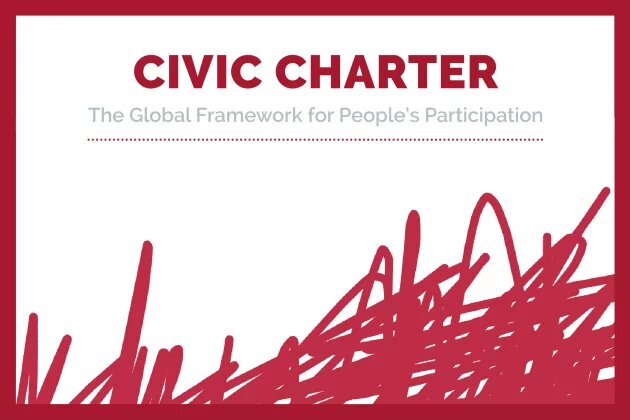
Repression of civil society is on the rise all over the world, even in supposedly democratic countries above reproach. Especially activists and organisations who advocate for democracy, human rights, and social and environmental justice are under pressure.
The Civic Charter was developed in collaboration with civil society actors from different continents and countries through extensive consultation and advisory processes. The Charter was launched in different locations around the world in October 2016 - from New Delhi via Nairobi to Berlin."
The charter aims to support civil society organizations as activists throughout the world, to advocate for their rights and freedom of action, and to demand government guarantees.
The Civic Charter is available in many different languages and can be signed by organizations and individuals through the platform at www.civiccharter.org.
More about:
- Our press release on the publication of the civic charter.
- Keynote by Arthur Larok at the Global Perspectives Conference on 26th October 2016: The Civic Charter: Another Passing Fad or the Missing Link?
- Our dossier: Squeezed – Space for Civil Society
Civic Charter
The Global Framework for People’s Participation
We, the people, have the right to participate in shaping our societies
Human rights and fundamental freedoms are increasingly violated worldwide. In a growing number of countries, people and their organisations face severe restrictions and are deprived of their rights to participate in shaping their societies. Activists are threatened, prosecuted, persecuted, imprisoned, tortured and killed. Civil society organisations are stigmatised, for example as foreign agents or extremists, hindered in their work, deprived of funding, forbidden to operate and dissolved. Avenues for people’s participation in public decision-making are restricted or closed down.
Yet, unless people genuinely participate, the world will be unable to overcome its most threatening challenges, including persistent poverty, violent extremism, growing inequality, and climate change.
People’s individual and collective participation brings life and gives meaning to democracy. It is vital in protecting human rights, achieving development and building just, tolerant and peaceful societies. It ensures that those who hold public offices, or other positions of power, are held accountable for their actions, and working for the common good.
We reject any attempt to prevent people from participating in shaping their communities, their countries and our common planet.
The Civic Charter provides a framework for people’s participation
The Civic Charter is grounded in our common humanity and universally accepted freedoms and principles. It provides a framework for people’s participation that identifies their rights within existing international law and agreements.
It is imperative that all governments, all levels of public administration, international institutions, business and civil society organisations worldwide fully respect and implement the provisions of this Charter.
We, the people, are entitled to the following rights, which must be respected, protected, promoted and fully implemented everywhere and without any discrimination:
1. Freedom of Expression: Everyone is free to share, discuss, and promote their views and ideas, support the ideas of others, or express dissent.
2. Freedom of Information: Everyone has easy and timely access to all public information
3. Freedom of Assembly: Everyone is free to peacefully come together with others to pursue common goals and aspirations.
4. Freedom of Association: Everyone is free to form, join, or support organisations to advance common causes in a peaceful manner.
To ensure that all people can enjoy these rights, the following must be guaranteed:
5.People and their organisations can genuinely participate in, and
6. Financial Support: support, both within and outside of their countries.
7. Opportunities for Cooperation: People and their organisations are free to engage in domestic and international dialogue and cooperation.
These rights can be legitimately claimed as long as they do not infringe on the rights of others, or incite or promote hatred, discrimination, hostility or violence.
To make sure that cooperation between people, their governments and public institutions
8. Duty to protect: Each government ensures that people and their organisations are free to participate without persecution, torture or threats to their lives, and are not subject to collective punishment for exercising their fundamental freedoms.
9. Enabling Environment: Each government adopts legislative, administrative, and other in this Charter, and investigates attacks on individuals and organisations with a view to bringing suspected perpetrators to justice in line with international standards of fairness.
10. Public Accountability: Government, business and civil society organisations are accountable to the public.
Our individual and collective responsibility
People and their organisations around the world are striving for justice and dignity. Their engagement provides us with the opportunity to collectively overcome our common challenges. Whether we are engaged in government, business, or civil society organisations, it is our collective responsibility to secure and contribute to a peaceful, just and sustainable future for us all.
As signatories
- We demand that all governments and their institutions respect, protect, promote and fully implement all international conventions and agreements that establish people’s rights to participate and we call on business, civil society organisations, international institutions and other actors to equally act in accordance with these conventions;
- We commit ourselves to defending and securing people’s rights to participation as established in
- this Charter;
- We stand in solidarity with all people whose rights to participate in shaping their societies are violated.
